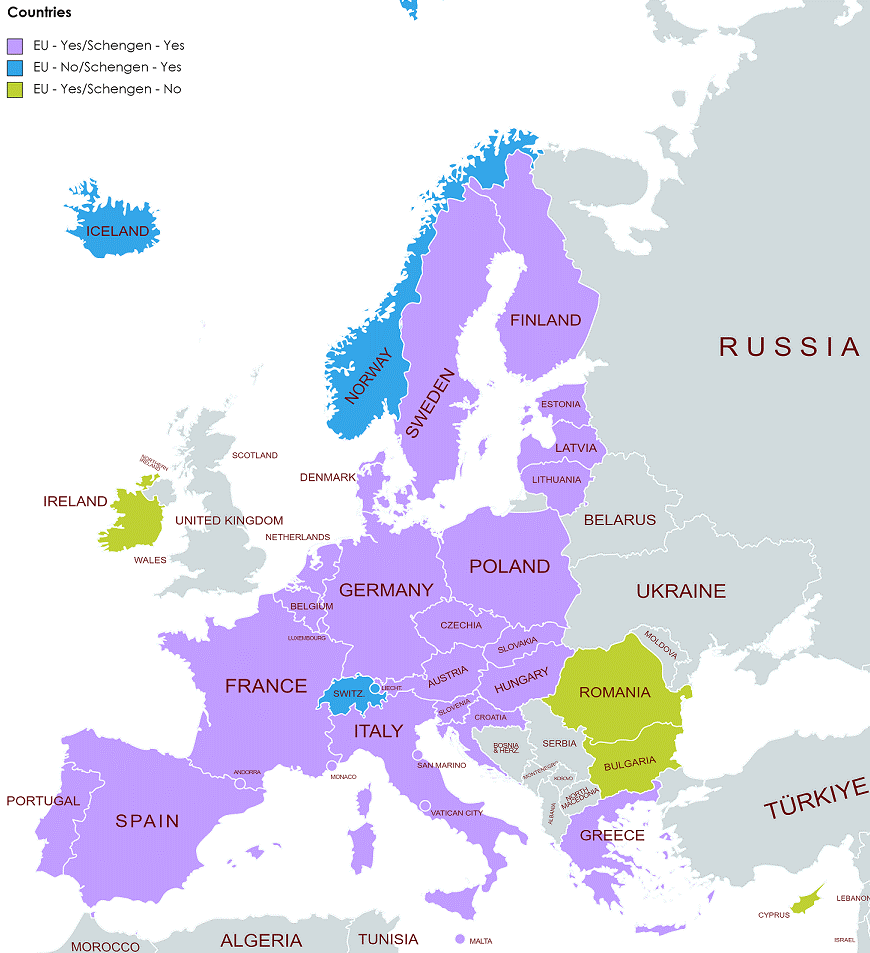Description

Copyright infringement not intended
Context: Croatia switched to the euro and entered Europe's passport-free zone -- two major milestones for the country after joining the European Union nearly a decade ago.
Details:
- Croatia switched to the euro and entered Europe's passport-free zone -- two major milestones for the country after joining the European Union nearly a decade ago.
- The Balkan nation bid farewell to its kuna currency and became the 20th member of the eurozone.
- It is now the 27th nation in the passport-free Schengen zone, the world's largest, which enables more than 400 million people to move freely around its members.
- The union of 27 member states located in Europe is called the European Union. Out of these only 20 countries have adopted Euro as their authorised currency. These countries are collectively known as the Eurozone.
- The remaining countries of the European Union have not adopted the Euro, these countries have their own separate currency.
- In December 1991, important decisions related to political, monetary and economic integration of the Europe were taken by the heads of the states of 12 members’ countries. This comes to be known as the Maastricht Treaty (Netherlands).
- “Maastricht Treaty” came into effect since November 1, 1993and gave birth to a new organisation known as “European Union”.
- The “Maastricht Treaty” and documents of the European Union, singed in the February, 1992 state that all countries of the European Union will do efforts to make a common monetary and economic policy. Due to the intense efforts in this direction, the common currency of the Eurozone came into existence since January 1, 1999.
- To be able to join the Eurozone the EU member states are required to fulfil the so-called 'Convergence Criteria'. These are economic and legal conditions agreed in the Maastricht Treaty in 1992 and are also known as the 'Maastricht criteria'.
- According to the Maastricht treaty, if a EU country wants to join the Eurozone, then it will have to meet these 4 following conditions:
- Low Inflation: If a country wants to be in the Eurozone, its inflation should not exceed 1.5% of the top three lowest inflation having countriesof Eurozone.
- Low Interest Rate:Interest rates should not exceed 2% as compared to the first three lowest interest rate having countries.
- The annual budget deficit of the aspirant country should not exceed 3% of the Gross Domestic Product of its economy.
- The debt of the aspirant country should not exceed 60% of the Gross Domestic Product of its economy.
.jpeg)
Schengen Area:
- Schengen Areasignifies a zone where 27 European countries, abolished their internal borders, for the free and unrestricted movement of people, in harmony with common rules for controlling external borders and fighting criminality by strengthening the common judicial system and police cooperation.
- Schengen Area covers most of the EU countries, except Ireland, and the countries that are soon to be part of the Schengen Area: Romania, Bulgaria, and Cyprus. Although not members of the EU, countries like Norway, Iceland, Switzerland and Lichtenstein are also part of the Schengen zone.
- 23 members fully implement the Schengen acquis,
- Four of them – members of the EFTA, implement Schengen acquis through specific agreements related to the Schengen agreement.
- Iceland, Norway, Switzerland and Lichtenstein are associate members of the Schengen Area but are not members of the EU. They are part of the EFTA and implement the Schengen acquis through specific agreements related to the Schengen agreement.
- Monaco, San Marino, and Vatican City have opened their borders with, but are not members of the visa-free zone.
- The Azores, Madeira, and the Canary Islands are special members of the EU and part of the Schengen Zone even though they are located outside the European continent.
- There are four more EU members, that have not joined the Schengen zone: Ireland – which still maintains opt-outs and Romania, Bulgaria, and Cyprus – that are seeking to join soon.
Schengen Area Countries:

About EU:
- European Union is an international organisation consisting of European Countries, which was formed in 1993.
- It came into force after the signing of the Maastricht Treatyby 28 countries.
- The Maastricht Treaty is also known as the Treaty of the European Union (TEU).
- Members of the EU: 27. UK made an exit from the EU on 31st January 2020
- European Union has 24 official languages
- Euro is the official currency for 19 of the 27 EU member countries
- The objectives of forming the European Union are:
- To increase political cooperation
- To enhance economic integration by creating a single currency the EURO.
- Unified security and foreign policy
- Common citizenship Rights
- Enhanced cooperation in the areas of judiciary, immigration and asylum.
- European Union was awarded the Nobel Prize for Peace in 2012.
https://www.ndtv.com/world-news/croatia-switches-to-euro-enters-europes-passport-free-zone-3655164













